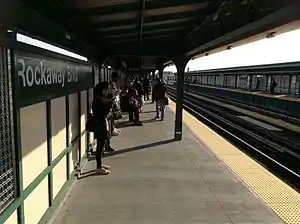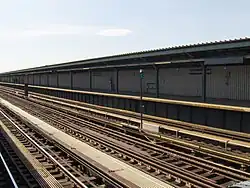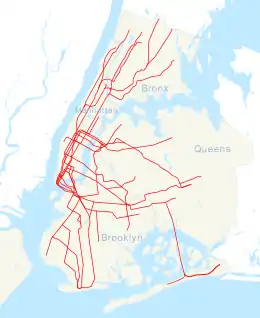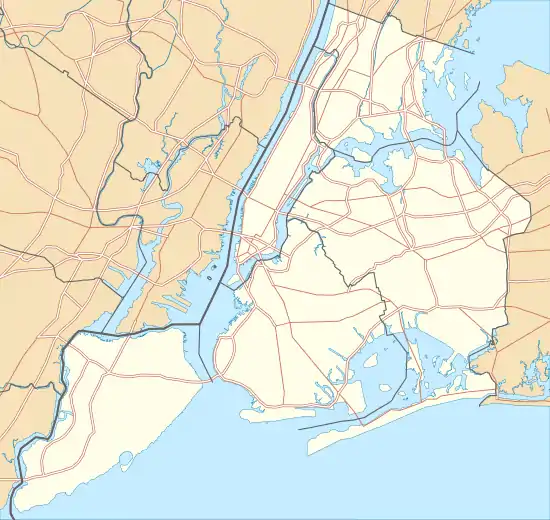Rockaway Boulevard station
The Rockaway Boulevard station is a station on the IND Fulton Street Line of the New York City Subway. Located at the intersection of Rockaway Boulevard, Woodhaven and Cross Bay Boulevards, and Liberty Avenue in Ozone Park, Queens, it is served by the A train at all times.
Rockaway Blvd | ||||||||||||||||||||||||||||||||||||||||||||||||||||||||||||||||||||||||||||||||||||||||||||||||||||||||||||||||||||||||||||||||||||||||||
|---|---|---|---|---|---|---|---|---|---|---|---|---|---|---|---|---|---|---|---|---|---|---|---|---|---|---|---|---|---|---|---|---|---|---|---|---|---|---|---|---|---|---|---|---|---|---|---|---|---|---|---|---|---|---|---|---|---|---|---|---|---|---|---|---|---|---|---|---|---|---|---|---|---|---|---|---|---|---|---|---|---|---|---|---|---|---|---|---|---|---|---|---|---|---|---|---|---|---|---|---|---|---|---|---|---|---|---|---|---|---|---|---|---|---|---|---|---|---|---|---|---|---|---|---|---|---|---|---|---|---|---|---|---|---|---|---|---|---|
 Brooklyn-bound platform after renovation | ||||||||||||||||||||||||||||||||||||||||||||||||||||||||||||||||||||||||||||||||||||||||||||||||||||||||||||||||||||||||||||||||||||||||||
| Station statistics | ||||||||||||||||||||||||||||||||||||||||||||||||||||||||||||||||||||||||||||||||||||||||||||||||||||||||||||||||||||||||||||||||||||||||||
| Address | Rockaway Boulevard & Liberty Avenue Queens, NY 11417 | |||||||||||||||||||||||||||||||||||||||||||||||||||||||||||||||||||||||||||||||||||||||||||||||||||||||||||||||||||||||||||||||||||||||||
| Borough | Queens | |||||||||||||||||||||||||||||||||||||||||||||||||||||||||||||||||||||||||||||||||||||||||||||||||||||||||||||||||||||||||||||||||||||||||
| Locale | Ozone Park | |||||||||||||||||||||||||||||||||||||||||||||||||||||||||||||||||||||||||||||||||||||||||||||||||||||||||||||||||||||||||||||||||||||||||
| Coordinates | 40.680459°N 73.843703°W | |||||||||||||||||||||||||||||||||||||||||||||||||||||||||||||||||||||||||||||||||||||||||||||||||||||||||||||||||||||||||||||||||||||||||
| Division | B (IND, formerly BMT)[1] | |||||||||||||||||||||||||||||||||||||||||||||||||||||||||||||||||||||||||||||||||||||||||||||||||||||||||||||||||||||||||||||||||||||||||
| Line | IND Fulton Street Line BMT Fulton Street Line (formerly) | |||||||||||||||||||||||||||||||||||||||||||||||||||||||||||||||||||||||||||||||||||||||||||||||||||||||||||||||||||||||||||||||||||||||||
| Services | A | |||||||||||||||||||||||||||||||||||||||||||||||||||||||||||||||||||||||||||||||||||||||||||||||||||||||||||||||||||||||||||||||||||||||||
| Transit | ||||||||||||||||||||||||||||||||||||||||||||||||||||||||||||||||||||||||||||||||||||||||||||||||||||||||||||||||||||||||||||||||||||||||||
| Structure | Elevated | |||||||||||||||||||||||||||||||||||||||||||||||||||||||||||||||||||||||||||||||||||||||||||||||||||||||||||||||||||||||||||||||||||||||||
| Platforms | 2 side platforms | |||||||||||||||||||||||||||||||||||||||||||||||||||||||||||||||||||||||||||||||||||||||||||||||||||||||||||||||||||||||||||||||||||||||||
| Tracks | 3 (2 in regular service) | |||||||||||||||||||||||||||||||||||||||||||||||||||||||||||||||||||||||||||||||||||||||||||||||||||||||||||||||||||||||||||||||||||||||||
| Other information | ||||||||||||||||||||||||||||||||||||||||||||||||||||||||||||||||||||||||||||||||||||||||||||||||||||||||||||||||||||||||||||||||||||||||||
| Opened | September 25, 1915[2] | |||||||||||||||||||||||||||||||||||||||||||||||||||||||||||||||||||||||||||||||||||||||||||||||||||||||||||||||||||||||||||||||||||||||||
| Accessible | not ADA-accessible; accessibility planned | |||||||||||||||||||||||||||||||||||||||||||||||||||||||||||||||||||||||||||||||||||||||||||||||||||||||||||||||||||||||||||||||||||||||||
| Accessibility | Same-platform wheelchair transfer available | |||||||||||||||||||||||||||||||||||||||||||||||||||||||||||||||||||||||||||||||||||||||||||||||||||||||||||||||||||||||||||||||||||||||||
| Opposite- direction transfer | Yes | |||||||||||||||||||||||||||||||||||||||||||||||||||||||||||||||||||||||||||||||||||||||||||||||||||||||||||||||||||||||||||||||||||||||||
| Former/other names | Rockaway Boulevard–96th Street | |||||||||||||||||||||||||||||||||||||||||||||||||||||||||||||||||||||||||||||||||||||||||||||||||||||||||||||||||||||||||||||||||||||||||
| Traffic | ||||||||||||||||||||||||||||||||||||||||||||||||||||||||||||||||||||||||||||||||||||||||||||||||||||||||||||||||||||||||||||||||||||||||||
| 2019 | 2,299,903[3] | |||||||||||||||||||||||||||||||||||||||||||||||||||||||||||||||||||||||||||||||||||||||||||||||||||||||||||||||||||||||||||||||||||||||||
| Rank | 203 out of 424[3] | |||||||||||||||||||||||||||||||||||||||||||||||||||||||||||||||||||||||||||||||||||||||||||||||||||||||||||||||||||||||||||||||||||||||||
| ||||||||||||||||||||||||||||||||||||||||||||||||||||||||||||||||||||||||||||||||||||||||||||||||||||||||||||||||||||||||||||||||||||||||||
| ||||||||||||||||||||||||||||||||||||||||||||||||||||||||||||||||||||||||||||||||||||||||||||||||||||||||||||||||||||||||||||||||||||||||||
| ||||||||||||||||||||||||||||||||||||||||||||||||||||||||||||||||||||||||||||||||||||||||||||||||||||||||||||||||||||||||||||||||||||||||||
| ||||||||||||||||||||||||||||||||||||||||||||||||||||||||||||||||||||||||||||||||||||||||||||||||||||||||||||||||||||||||||||||||||||||||||
| ||||||||||||||||||||||||||||||||||||||||||||||||||||||||||||||||||||||||||||||||||||||||||||||||||||||||||||||||||||||||||||||||||||||||||
| ||||||||||||||||||||||||||||||||||||||||||||||||||||||||||||||||||||||||||||||||||||||||||||||||||||||||||||||||||||||||||||||||||||||||||
| ||||||||||||||||||||||||||||||||||||||||||||||||||||||||||||||||||||||||||||||||||||||||||||||||||||||||||||||||||||||||||||||||||||||||||
History
Rockaway Boulevard was one of the six stations along Liberty Avenue in Queens, from 80th Street through Ozone Park–Lefferts Boulevard, as well as the current three track elevated structure, built for the BMT Fulton Street Line in 1915 as part of BMT's portion of the Dual Contracts.[2][4]
On April 8, 1928, two eastbound trains crashed in the station, killing one person and injuring 30.[5]
The connection to the BMT was severed on April 26, 1956, and the IND was extended east (railroad south) from Euclid Avenue via a connecting tunnel and new intermediate station at Grant Avenue, with the new service beginning on April 29, 1956.[4][6][7] Two months later, a connection to the IND Rockaway Line was provided on June 26, 1956, replacing the Long Island Rail Road's long-troubled Rockaway Beach Branch.[8][9][10][11][12][13]
The station was completely renovated in 2015.[14] In 2019, as part of an initiative to increase the accessibility of the New York City Subway system, the MTA announced that it would install elevators at the Rockaway Boulevard station as part of the MTA's 2020–2024 Capital Program.[15] In November 2022, the MTA announced that it would award a $965 million contract for the installation of 21 elevators across eight stations,[16] including Rockaway Bouelvard.[17][18]: 81 A joint venture of ASTM and Halmar International would construct the elevators under a public-private partnership.[17][18]: 80
Station layout
| Platform level | Side platform | |
| Westbound | ← ← | |
| Peak-direction express | No regular service | |
| Eastbound | (No express service: Ozone Park–Lefferts Boulevard) | |
| Side platform | ||
| Mezzanine | Fare control, station agent, Metrocard machines | |
| Ground | Street level | Exit/entrance |

This station has two side platforms and three tracks. The center track is not used in revenue service.[19] The A train stops here at all times; a shuttle train from Euclid Avenue to Ozone Park–Lefferts Boulevard also serves the station during late nights.[20] The platforms have beige windscreens and green and brown canopies.
This is the outermost station from Manhattan that is shared by all A train branches. Just past the east end of the platforms, the line splits into two routes. Trains heading to Lefferts Boulevard continue east along Liberty Avenue, while those heading to the Rockaways diverge south to bypass Aqueduct Racetrack on an embankment before lowering to run at-grade towards Conduit Avenue, Howard Beach, Jamaica Bay, Broad Channel, and then the Rockaways.[21] The next stop to the east (railroad south) is 104th Street for trains to Lefferts Boulevard and Aqueduct–North Conduit Avenue for trains to the Rockaways; northbound trains departing Aqueduct–North Conduit Avenue first stop at Aqueduct Racetrack before stopping at Rockaway Boulevard. The next stop to the west (railroad north) is 88th Street.[21]
Exits
This station has two station-houses with the full-time one at the west (railroad north) end. Single staircases from each platform go down to the elevated station-house beneath the tracks. Inside are a turnstile bank and token booth. Outside of fare control, two staircases lead to either side of Liberty Avenue at Woodhaven/Cross Bay Boulevard.[22]
The other station-house at the east (railroad south) end is also elevated and beneath the tracks, but unstaffed. It contains two HEET turnstiles, a staircase to each platform, and two staircases to either side of Liberty Avenue at 96th Street. The wooden staircase landings have a high exit-only turnstile to allow passengers to exit the system without having to go through the station.[22]
References
- "Glossary". Second Avenue Subway Supplemental Draft Environmental Impact Statement (SDEIS) (PDF). Vol. 1. Metropolitan Transportation Authority. March 4, 2003. pp. 1–2. Archived from the original (PDF) on February 26, 2021. Retrieved January 1, 2021.
- "New Elevated Line Opened for Queens" (PDF). The New York Times. September 26, 1915. Retrieved September 28, 2007.
- "Facts and Figures: Annual Subway Ridership 2014–2019". Metropolitan Transportation Authority. 2020. Retrieved May 26, 2020.
- Sparberg, Andrew J. (October 1, 2014). From a Nickel to a Token: The Journey from Board of Transportation to MTA. Fordham University Press. ISBN 978-0-8232-6190-1.
- "One Killed, 30 Hurt in B.M.T. Collision". The New York Times. April 8, 1928. Retrieved July 16, 2016.
- "First Leg of Rockaways Transit Opened at Cost of $10,154,702" (PDF). The New York Times. April 30, 1956. Retrieved June 29, 2015.
- Freeman, Ira Henry (June 28, 1956). "Rockaway Trains to Operate Today" (PDF). The New York Times. Retrieved June 29, 2015.
- "PRR Chronology, 1956" (PDF). (45.9 KiB), December 2004 Edition
- Freeman, Ira Henry (June 28, 1956). "Rockaway Trains to Operate Today" (PDF). The New York Times. Retrieved June 29, 2015.
- "First Train On Rockaway Line Runs This Afternoon". Wave of Long Island. Fultonhistory.com. June 28, 1956. p. 1. Retrieved August 16, 2016.
- "First Train On Rockaway Line Runs This Afternoon". Wave of Long Island. Fultonhistory.com. June 28, 1956. p. 6. Retrieved August 16, 2016.
- "TA's New Line To Rockaways Begins Today: Fifty Piece Band To Play as Special Train Makes First Run". The Leader-Observer. Fultonhistory.com. June 28, 1956. p. 1. Retrieved August 16, 2016.
- "To Rockaways: Beach Trains In Operation". Greenpoint Weekly Star. Fultonhistory.com. June 29, 1956. p. 2. Retrieved August 16, 2016.
- "Rockaway Boulevard a Train Platform to Close for Summer Construction".
- "Press Release - MTA Headquarters - MTA Announces 20 Additional Subway Stations to Receive Accessibility Improvements Under Proposed 2020-2024 Capital Plan". mta.info. Metropolitan Transportation Authority. December 19, 2019. Retrieved December 20, 2019.
- Nessen, Stephen (November 28, 2022). "MTA to spend more than $1B on accessibility upgrades". Gothamist. Retrieved December 1, 2022.
- Brachfeld, Ben (November 29, 2022). "MTA to spend $1 billion on subway, commuter rail accessibility upgrades". amNewYork. Retrieved December 1, 2022.
- "Capital Program Oversight Committee Meeting November 2022". mta.info. Metropolitan Transportation Authority. November 29, 2022. Retrieved July 14, 2022.
- Dougherty, Peter (2020). Tracks of the New York City Subway 2020 (16th ed.). Dougherty. OCLC 1056711733.
- "A Subway Timetable, Effective June 26, 2022". Metropolitan Transportation Authority. Retrieved August 26, 2023.
- "Subway Map" (PDF). Metropolitan Transportation Authority. September 2021. Retrieved September 17, 2021.
- "MTA Neighborhood Maps: Woodhaven" (PDF). mta.info. Metropolitan Transportation Authority. 2015. Retrieved June 30, 2015.
External links
- nycsubway.org – IND Fulton: Rockaway Boulevard
- Station Reporter — A Lefferts
- Station Reporter — A Rockaway
- The Subway Nut — Rockaway Boulevard Pictures
- 94th Street/Rockaway Boulevard entrance from Google Maps Street View
- 96th Street/Cross Bay Boulevard — Woodhaven Boulevard entrance from Google Maps Street View
- Platforms from Google Maps Street View


